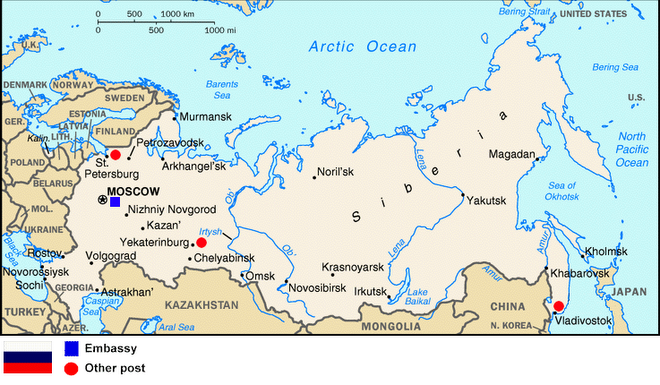 It is not exactly heart-warming when the head of the Russian army goes on State TV and tells the Russian population: "... to defend the sovereignty and territorial integrity of Russia and its allies, military forces will be used, including preventively, including with the use of nuclear weapons..."
It is not exactly heart-warming when the head of the Russian army goes on State TV and tells the Russian population: "... to defend the sovereignty and territorial integrity of Russia and its allies, military forces will be used, including preventively, including with the use of nuclear weapons..."Russia feeling insecure is becoming a rich theme at present. Rupert Wingfield Hayes, one of the BBC's better correspondents in Moscow, broadcast about 'Russia's inferiority complex' just before Christmas. Personally, I struggle to understand why Russia should feel inferior - its got Europe by the gas-guzzling balls; is likely to be one of the few economies to experience GDP growth in 2008 - although perhaps less than the government reckons it will achieve - and has wrested political stability from the edge of fracture and chaos. But perhaps the key is that - in Presidential election year - it is thought that the people need to be reminded they have enemies all around them and would be under threat if not for the might of the state. Of course there is no real truth or necessity to this statement: but it is good domestic realpolitik. Especially if Ukraine pours fuel on the fire of Russo-Occidental relations by pushing NATO membership.
Speaking of Ukraine, the excellent English-language blog on Ukrainian politics, Foreign Notes (which is worth reading, despite the very crappy template it uses) has just flagged the latest paper from the Defence Academy of the United Kingdom which has published Russia and the West: a reassessment. You can download it. It will be my bedtime reading tonight, but I think it starts spot-on:
"A powerful Russia... is a fact of life... They are no longer seeking [the West's] approval... The post-Cold War partnership, founded at a time of Russian disorientation and weakness, is history.
"...Although Russia is not a global threat, it seeks to be both enabler and spoiler. It will exploit our difficulties in Iraq and Afghanistan and leverage its influence in Iran to diminish Western influence in the former USSR, where
it will use both hard and soft power to resurrect its dominance." [my emphasis]Recently, there has been some colourful talk in Moscow about the 'resurrection of the USSR by 2010' (I gather radio Ekho Mosckviy ran a talk-show on this) and I have even found a delightfully barking blog dedicated to this idea. I am not sure I buy the remake of the USSR, but I suppose a lot of Cold Warriors will be feeling nostalgic today.
I think it was my mate, Talleyrand, who first said: "Russia is never as strong as she looks; Russia is never as weak as she looks". Which not so long ago, President Putin amended this to comment: "Russia was never so strong as it wants to be and never so weak as it is thought to be."
Too true. Nukes are of course central to Russian defence if, for a moment, you consider how the military top brass struggles with a largely conscript army of uncertain efficacy where, apparently, it is proving harder and harder to boost the number of contract soldiers.

[The map above is from the Natural Resource Defence Council, those cuddly US-greenies. It is what they call their 'US playbook for nuclear attack'. The blue dots are de-commissioned missiles silos, the NRDC claims to have tracked from de-classified US military sources concerning nuclear attack targets. The red dots, they say, are the sites of 360 operational nuclear silos the US has pre-programed as targets, according to declassified sources. But as I recall, most of the Russian nuclear missile capability is road-mobile or submarine based: precisely because the USA has so many of the land silos identified.]





No comments:
Post a Comment